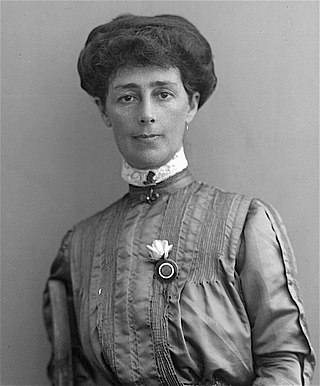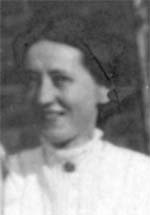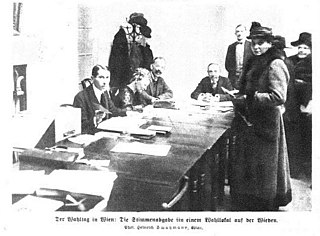Women's suffrage is the right of women to vote in elections. In the beginning of the 18th century, some people sought to change voting laws to allow women to vote. Liberal political parties would go on to grant women the right to vote, increasing the number of those parties' potential constituencies. National and international organizations formed to coordinate efforts towards women voting, especially the International Woman Suffrage Alliance.

Eleanor Florence Rathbone was an independent British Member of Parliament (MP) and long-term campaigner for family allowance and for women's rights. She was a member of the noted Rathbone family of Liverpool.
As in other countries, feminism in the United Kingdom seeks to establish political, social, and economic equality for women. The history of feminism in Britain dates to the very beginnings of feminism itself, as many of the earliest feminist writers and activists—such as Mary Wollstonecraft, Barbara Bodichon, and Lydia Becker—were British.

Vida Jane Mary Goldstein was an Australian suffragist and social reformer. She was one of four female candidates at the 1903 federal election, the first at which women were eligible to stand.

Leonora O’Reilly was an American feminist, suffragist, and trade union organizer. O'Reilly was born in New York state, raised in the Lower East Side of New York City. She was born into a working-class family and left school at the age of eleven to begin working as a seamstress. Leonora O’Reilly’s parents were Irish immigrants escaping the Great Famine; her father, John, was a printer and a grocer and died while Leonora was the age of one, forcing her mother, Winifred Rooney O’Reilly, to work more hours as a garment worker in order to support Leonora and her younger brother.

The Women's Freedom League was an organisation in the United Kingdom which campaigned for women's suffrage and sexual equality. It was an offshoot of the militant suffragettes after the Pankhursts decide to rule without democratic support from their members.

Anti-suffragism was a political movement composed of both men and women that began in the late 19th century in order to campaign against women's suffrage in countries such as Australia, Canada, Ireland, the United Kingdom and the United States. To some extent, Anti-suffragism was a Classical Conservative movement that sought to keep the status quo for women. More American women organized against their own right to vote than in favor of it, until 1916. Anti-suffragism was associated with "domestic feminism," the belief that women had the right to complete freedom within the home. In the United States, these activists were often referred to as "remonstrants" or "antis."

Madeline (Madge) McDowell Breckinridge was an American leader of the women's suffrage movement in Kentucky. She married Desha Breckinridge, editor of the Lexington Herald, which advocated women's rights, and she lived to see the women of Kentucky vote for the first time in the presidential election of 1920. She also initiated progressive reforms for compulsory school attendance and child labor. She founded many civic organizations, notably the Kentucky Association for the Prevention and Treatment of Tuberculosis, an affliction from which she had personally suffered. She led efforts to implement model schools for children and adults, parks and recreation facilities, and manual training programs.

A movement to fight for women's right to vote in the United Kingdom finally succeeded through acts of Parliament in 1918 and 1928. It became a national movement in the Victorian era. Women were not explicitly banned from voting in Great Britain until the Reform Act 1832 and the Municipal Corporations Act 1835. In 1872 the fight for women's suffrage became a national movement with the formation of the National Society for Women's Suffrage and later the more influential National Union of Women's Suffrage Societies (NUWSS). As well as in England, women's suffrage movements in Wales, Scotland and other parts of the United Kingdom gained momentum. The movements shifted sentiments in favour of woman suffrage by 1906. It was at this point that the militant campaign began with the formation of the Women's Social and Political Union (WSPU).

A suffragette was a member of an activist women's organisation in the early 20th century who, under the banner "Votes for Women", fought for the right to vote in public elections in the United Kingdom. The term refers in particular to members of the British Women's Social and Political Union (WSPU), a women-only movement founded in 1903 by Emmeline Pankhurst, which engaged in direct action and civil disobedience. In 1906, a reporter writing in the Daily Mail coined the term suffragette for the WSPU, derived from suffragist, in order to belittle the women advocating women's suffrage. The militants embraced the new name, even adopting it for use as the title of the newspaper published by the WSPU.

Caroline Maria Seymour Severance (1820–1914) was an American abolitionist, suffragist, and founder of women's clubs.

Pauline Agassiz Shaw was an American philanthropist and social reformer who opened day nurseries, settlement houses, and other establishments in Boston to help new immigrants and the poor. She financed public kindergartens, and co-founded America's first trade school, the North Bennet Street School. She was also a vocal advocate for women's rights.

Women's suffrage in Wales has historically been marginalised due to the prominence of societies and political groups in England which led the reform for women throughout the United Kingdom. Due to differing social structures and a heavily industrialised working-class society, the growth of a national movement in Wales grew but then stuttered in the late nineteenth century in comparison with that of England. Nevertheless, distinct Welsh groups and individuals rose to prominence and were vocal in the rise of suffrage in Wales and the rest of Great Britain.
The Women's suffrage movement in India fought for Indian women's right to political enfranchisement in Colonial India under British rule. Beyond suffrage, the movement was fighting for women's right to stand for and hold office during the colonial era. In 1918, when Britain granted limited suffrage to women property holders, the law did not apply to British citizens in other parts of the Empire. Despite petitions presented by women and men to the British commissions sent to evaluate Indian voting regulations, women's demands were ignored in the Montagu–Chelmsford Reforms. In 1919, impassioned pleas and reports indicating support for women to have the vote were presented by suffragists to the India Office and before the Joint Select Committee of the House of Lords and Commons, who were meeting to finalize the electoral regulation reforms of the Southborough Franchise Committee. Though they were not granted voting rights, nor the right to stand in elections, the Government of India Act 1919 allowed Provincial Councils to determine if women could vote, provided they met stringent property, income, or educational levels.

Lolita Roy, also known as Mrs. P. L. Roy, was an Indian social reformer and suffragist who played an active role in the social life of Indians in London, as well as in campaigns for women's suffrage in Britain and India. She was described in The Vote in 1911 as 'one of the most emancipated of Indian women'.

Women's suffrage was introduced in Austria on 12 November 1918 with the foundation of the Republic of Austria after the fall of the Habsburg monarchy with the end of World War I. While men had gained the right to vote in the years of 1861 until 1907, women were explicitly excluded from political participation since the February Patent in 1861.
Nellie Latrielle was a Jamaican political activist and feminist. She was a pioneer within the struggle for women's suffrage in Jamaica.
Judith DeCordova (1877–1967) was a Jamaican political activist and feminist. She was a pioneer within the struggle for women's suffrage in Jamaica.












